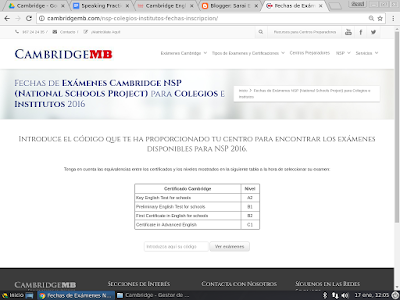Cambridge English 2017
Llegó la hora de ponernos serios con nuestro exámenes de Cambridge. Como nos han informado en la reunión celebrada el día 17/1/2017. Plazo para matricularnos hasta el 15 de MARZO.
Para realizar la matrícula debéis seguir estos pasos:
1. Ir a la página: http://cambridgemb.com/
2. Seleccionar el icono National School Project (el logo que veis en azul abajo a la derecha – OJO si no lo hacéis a través de este no podréis disfrutar de los descuentos!)
3. Te aparecerá la siguiente pantalla:
4. Abajo aparece el campo «Introduzca su código aquí»:
El código de nuestro centro es: BEMBEZAR2017
5. «Ver examenes» –> aparecerá un formulario para rellenar con vuestros datos (os solicita información de la cuenta de crédito y de la tarjeta, por lo que os recomiendo la tengáis presente cuando vayáis a rellenarla).
General Tips for the Exam
Although each part is different, there are several things that you should bear in mind during the whole test. Let’s see:
- You are assessed individually, so don’t worry about being better or worse than your partner. As former oral examiner, Stephen Hasler, recently said, “neither the partner nor the examiners are the enemy. Your only enemy in the room can be yourself.“
- In this test you must show that your level of English is within the B2 scopeor above. For this reason, it is not enough to be communicative, as it was at lower levels. In this case you must use a range of grammatical structures and vocabulary that are characteristic of a B2 level of English.
- It is OK if the examiner stops you, so don’t worry if you talk until he/she cuts you off.
- Be as spontaneous as possible. Do not memorise a sort of “speech” for the exam. The examiners will notice right away.
- Always answer exactly what you are being asked. If you start talking about something irrelevant, the examiners will cut you off and move on to another question.
- Always pay attention to your partner‘s opinions and questions. You’re supposed to express agreement/disagreement, to hold a conversation and to discuss different ideas (parts 2, 3 & 4), so don’t ignore what he/she is saying!
- Be polite. Even if you disagree with your partner’s opinions, you must always be polite! There are many structures to disagree politely, so make sure you know them and know how to use them before you take the exam.
- Smile! You’d be surprised by what a smile can do! If you smile, everyone in the room will be more open and receptive to what you have to say for yourself. This may positively affect your overall score!


